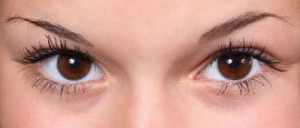 If you constantly see specks, flashes of light or bright streaks floating through your line of sight, it might cause you concern. And if those specks, dots, squiggles – even flickering lights and lightening bolts — disappear when you try to stare right at them, it can make the experience even more alarming. But the truth about this weird vision issue is that’s it’s fairly common, and most people have some version of it.
If you constantly see specks, flashes of light or bright streaks floating through your line of sight, it might cause you concern. And if those specks, dots, squiggles – even flickering lights and lightening bolts — disappear when you try to stare right at them, it can make the experience even more alarming. But the truth about this weird vision issue is that’s it’s fairly common, and most people have some version of it.
Eye floaters and flashes
Seven out of 10 of us experience this common vision phenomenon at some point in our lives. There are different types of floaters, but they all occur in the vitreous gel, the clear substance that fills our eyes, helping our eyeballs keep their shape and allowing light to pass through our retinas. As we get older and the vitreous gel thickens or shrinks, particles form in the gel. These particles block the light passing through our eyes, casting shadows on the retina – which we see as floaters, due to:
- Formation of protein clumps
These floaters usually look like squiggles, cobwebs, tadpoles or circles. They remain in the vitreous gel permanently, and can be ignored. - Bursting blood vessels in the retina as a shrinking vitreous gel pulls on them
These floaters usually look little black dots, which can resemble smoke or a cloud of gnats. They can last for months, but usually resolve themselves as the body reabsorbs the blood. - Posterior vitreous detachment (PVD)
The vitreous gel pulling away from the retina can cause floaters that resemble cobwebs, mist or a veil that obscures part of your field of vision. The floaters usually become less noticeable after a few months. Lightening streaks or light flickers accompanied by floaters can also be PVD. These flashes may appear off and on for weeks or months, but normally fade eventually.
When floaters could signal a health problem
If you have rapid onset of eye floaters and flashes, it could indicate that you have a retinal tear. You should call us a.s.a.p. because without immediate treatment, this could cause you to lose your eyesight: 561.338.7722.


